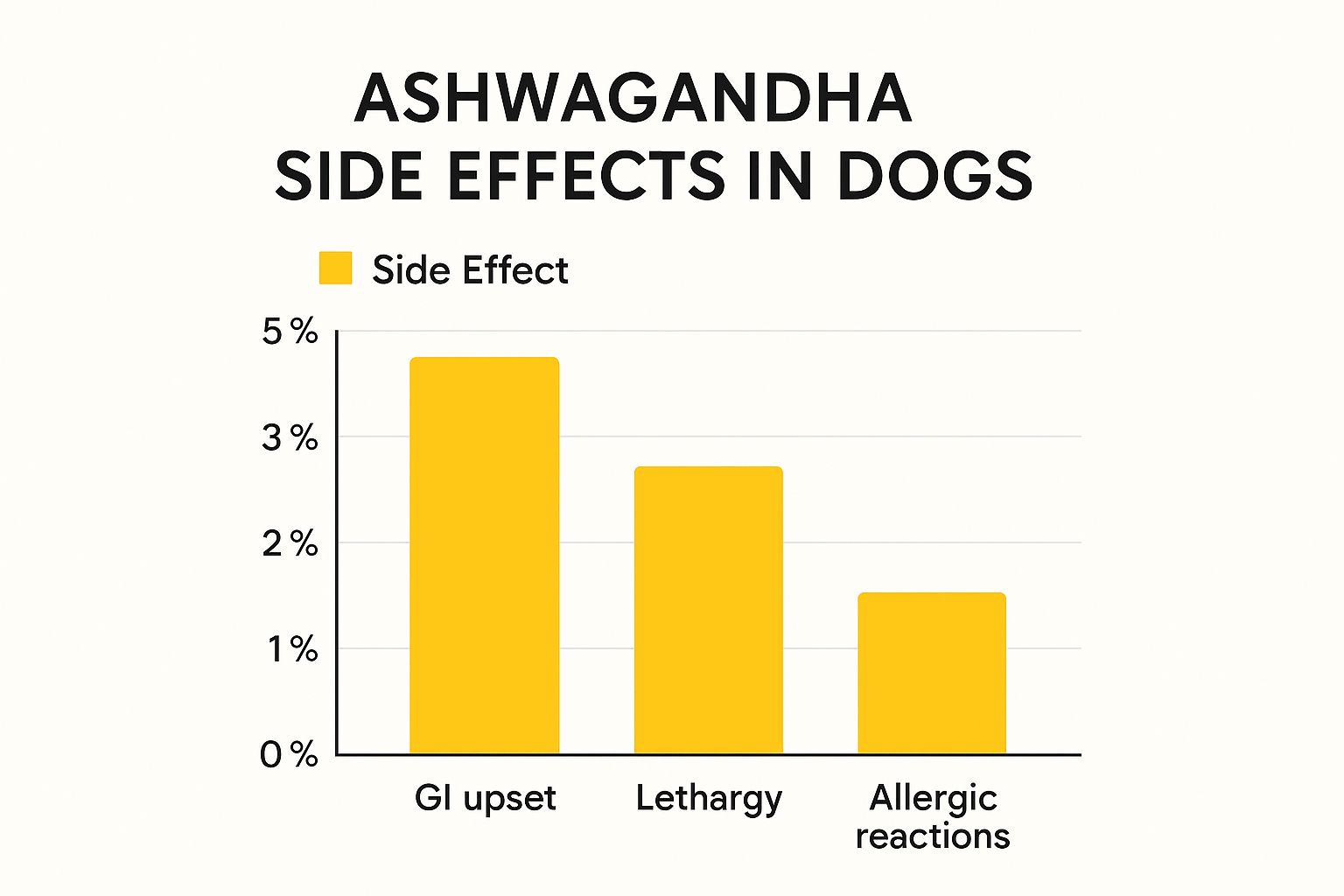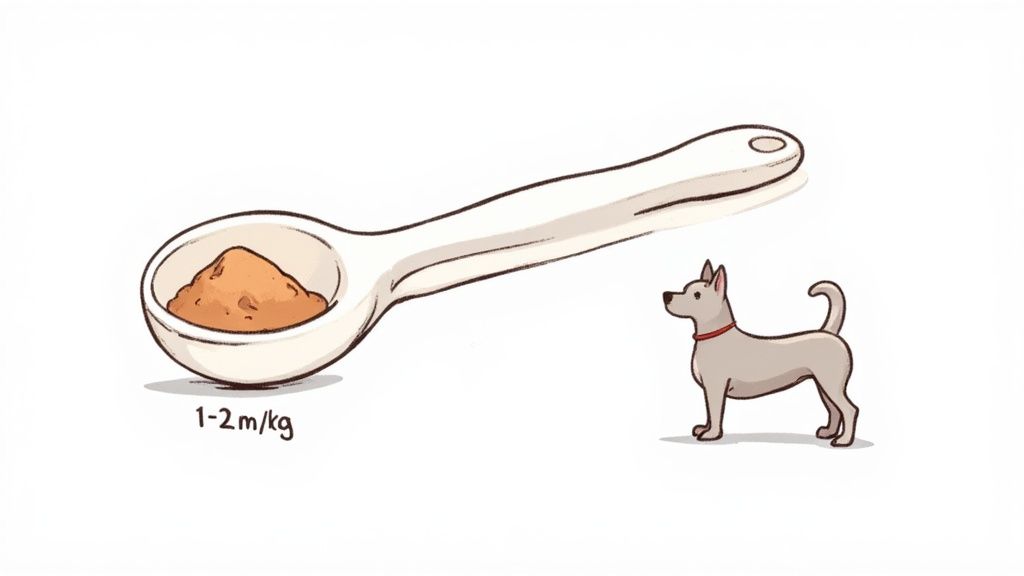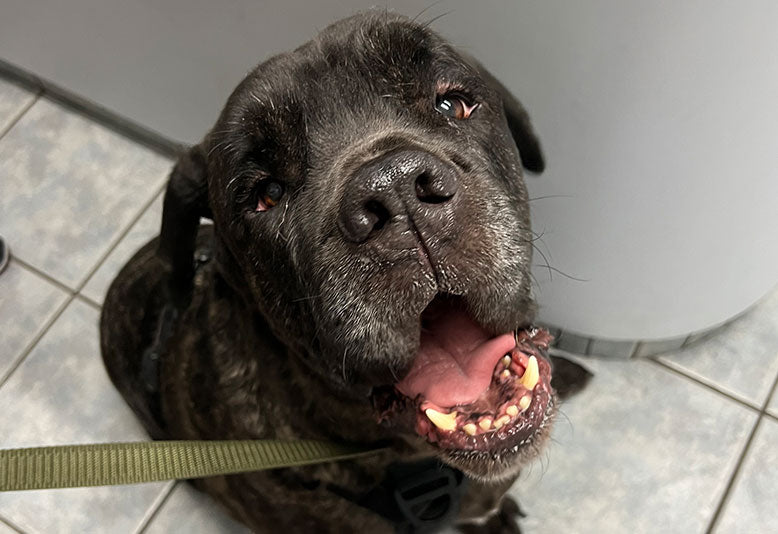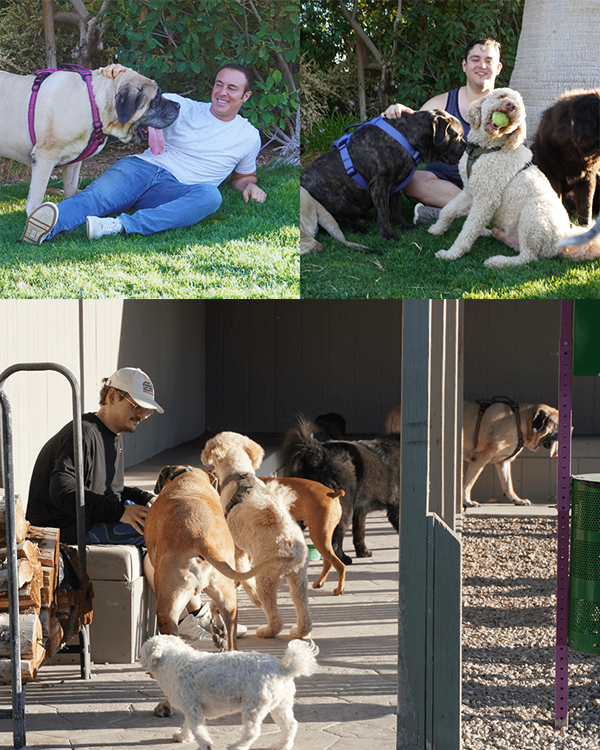
Can Dogs Have Ashwagandha? Your Gentle Guide to This Calming Herb
Yes, when used with care, ashwagandha can be a gentle and supportive option for many dogs. This ancient herb is known as an adaptogen, which is a simple way of saying it helps support your dog's natural ability to cope with stress and find their calm. It’s not a miracle cure, but we've seen it become a wonderful tool for pet parents looking to help their best friend handle life's little hurdles with more grace.
Your Gentle Answer on Ashwagandha for Dogs

It’s a story we know well. Your loyal companion seems a little more anxious lately—maybe pacing at night, or just not quite their usual self. You start looking for answers, and those 3 AM internet searches often lead you down the path of natural support. That’s when the question pops up: "Can dogs have ashwagandha?" If you're asking this, you’re not alone. Many loving pet parents are searching for the same gentle ways to bring their dogs comfort.
This powerful herb, also known by its botanical name Withania somnifera (or sometimes called "Indian ginseng"), has a history stretching back thousands of years in Ayurvedic medicine for promoting balance and vitality. Think of it less like a medication and more like a supportive friend for your dog’s body. It works with their system, not just on it, helping them adapt to whatever life throws their way.
Here’s a quick overview of what to keep in mind on this journey.
Ashwagandha for Dogs at a Glance
| Aspect | Key Takeaway |
|---|---|
| Primary Use | Stress and anxiety support, promoting a sense of calm. |
| Type of Herb | An adaptogen, which helps the body adapt to and resist stress naturally. |
| Safety | Generally safe when used at the correct dosage. We always recommend a chat with your vet. |
| Best For | Dogs with situational anxiety, age-related restlessness, or general stress. |
| Key Benefit | Supports the body's natural systems rather than forcing a specific outcome. |
Ultimately, this is about finding a balanced, natural way to support your dog's well-being.
What Is Ashwagandha?
At its heart, ashwagandha is an adaptogen. It’s a simple but powerful concept. Imagine your dog has an internal thermostat that manages their response to stress. An adaptogen doesn't just crank the heat up or down; instead, it helps that thermostat work more efficiently, maintaining things in a comfortable, balanced range.
This kind of natural support can be especially useful for:
- Promoting Calm: Helping dogs who get overwhelmed by thunderstorms, car rides, or the dreaded separation from their favorite human.
- Supporting Aging Dogs: Gently assisting senior dogs who might be dealing with cognitive changes, confusion, or restless nights.
- Maintaining Balance: Supporting the body’s own hormonal and immune systems so they can function as they should.
We know that behind every question is a devoted pet parent who just wants the best for their dog. Our goal here is to give you clear, gentle answers so you can feel confident and empowered in the choices you make for your companion’s health.
Looking into ashwagandha is a wonderful step toward proactively supporting your dog. It's about creating more good days together, celebrating the small wins, and giving them the gentle comfort they deserve. In the sections that follow, we'll dive deeper into how it works and, most importantly, how to use it safely.
Get Your FREE Dog Brain Health Guide

Get instant FREE access to today's top ways to help your best friend live a longer, healthier, happier life.
- 39 value-packed pages of expert insights
- Early-detection tips for cognitive decline
- Top brain-boosting superfoods
- Vet-approved mental sharpness strategies
- Fun IQ tests for your dog
How Ashwagandha Gently Supports Your Dog

To understand how ashwagandha can help your dog, picture their body having an internal ‘stress thermostat.’ This system, technically called the hypothalamic-pituitary-adrenal (HPA) axis, is in charge of how they react to daily stressors—everything from a sudden, loud noise to the familiar jingle of you grabbing your keys. As dogs get older, this internal thermostat can start to become less efficient.
This is where ashwagandha comes in. As an adaptogen, this special herb helps the body find and maintain its natural balance. Instead of forcing a change, it gently nudges that internal thermostat, helping it work more effectively. This means it helps your dog's body adapt to whatever life throws at it without overreacting or underreacting.
This natural support helps regulate the body's production of cortisol, often called the "stress hormone." Think of it like a volume knob for their stress signals. When things get a little too loud and overwhelming, ashwagandha helps turn that volume down, fostering a much-needed sense of calm and well-being.
Promoting Calm and Clarity
When cortisol levels stay high for too long, it can lead to restlessness, anxious behaviors like constant pacing, and even what looks like confusion. By helping the body maintain a more balanced cortisol response, ashwagandha can support your dog’s ability to settle down, which can be a game-changer during stressful events or for getting a good night's sleep.
Let's be clear: this isn't about sedating your dog. It’s about restoring their natural equilibrium. The aim is simply to help your dog's own systems work better, leading to small but meaningful improvements in their daily comfort and mental clarity. It's amazing how these little changes can build on one another, leading to more peaceful days for both of you.
The herb's benefits often spill over into cognitive support, too. By helping manage the physical fallout from stress, it can create a healthier internal environment for the brain. This is why so many dog owners report that their pups seem more present and engaged. If you're interested in other ways to support your dog's brain health, you can learn more in our other guides about canine nutrition and supplements.
How Ashwagandha Works in the Body
So, what’s the secret sauce? Ashwagandha is packed with active compounds called withanolides, and these are believed to be responsible for most of its supportive properties. They interact with different pathways throughout your dog's body.
Here are a few ways it gently goes to work:
- Supports Adrenal Function: It helps maintain the health of the adrenal glands, which are ground zero for the body's entire stress response system.
- Promotes Neurotransmitter Balance: It lends a hand to the brain chemicals responsible for regulating mood and promoting calmness.
- Provides Antioxidant Support: It helps protect cells—including delicate brain cells—from the oxidative stress that naturally comes with aging.
"Ashwagandha doesn't force the body into a state of calm. Instead, it provides the natural support needed for the body to find its own balance. It’s about creating resilience from within."
Every dog's journey is unique, and their response will be their own. But by understanding how this ancient herb works, you can feel more confident about giving this gentle, natural support to your best friend, helping them navigate their golden years with a little more comfort and grace.
Getting the Ashwagandha Dosage Just Right for Your Dog
We completely understand. Whenever you consider adding something new to your dog’s routine, the first question is always, "How much is safe and effective?" Being cautious is the hallmark of a great pet parent, and figuring out the right amount of ashwagandha is all about starting small and paying close attention.
Every dog is an individual, so their body will respond in its own way. That’s why the "start low and go slow" method is the gold standard. It lets you gently introduce the herb into their system, giving them time to adjust and ensuring the whole experience is a positive one from the start.
A Science-Backed Starting Point
While every dog's needs are different, solid research gives us a reliable and reassuring place to begin. The idea is to give enough to be helpful without overdoing it.
A key 2022 clinical trial gave us some fantastic insights here. The study found that a daily dose of 15 mg of ashwagandha root extract per kilogram of body weight was not only safe but also supported a noticeable drop in stress-related markers in dogs. It’s this kind of research that helps us move past guesswork and make decisions based on real evidence.
This science-backed guideline provides a safe and effective daily range based on weight, which is a practical way for any dog owner to get started.
Suggested Daily Ashwagandha Dosage by Dog Weight
Based on clinical findings, here's a helpful chart to guide you. Remember, this is a starting point, and it's always best to begin on the lower end of the suggested range for your dog's weight.
| Dog Size | Weight Range | Suggested Daily Dosage (mg) |
|---|---|---|
| Small | 10-30 lbs | 50-150 mg |
| Medium | 31-60 lbs | 150-300 mg |
| Large | 61-100 lbs | 300-500 mg |
| Extra-Large | Over 100 lbs | 500-800 mg |
Starting with these amounts allows you to monitor your dog's response and make small, careful adjustments as needed.
What About Side Effects?
The good news is that ashwagandha is very well-tolerated by most dogs. Side effects are rare and typically mild when they do occur.

As you can see, a little tummy trouble is the most common issue, which is another great reason to introduce it gradually.
Always Partner With Your Vet
Before you start any new supplement, a quick chat with your veterinarian is essential. They have the full picture of your dog's health history and can offer personalized advice, especially if your dog has pre-existing conditions or is on other medications.
Think of your vet as a key player on your dog's wellness team. They’re there to help you make the most informed and confident choices.
"The right dosage isn't a rigid number—it's the amount that brings your dog gentle support and comfort. Starting small and adjusting with care is the most loving approach you can take."
If you’d like to learn more about creating a supportive wellness routine for your best friend, you can find more great information in our other articles on canine nutrition and supplements. Together, we can find the best path forward to help your dog enjoy more good days.
Supporting More Peaceful Nights for Your Dog

It’s heartbreaking to watch your dog pacing the house at 3 AM, unable to settle. Those quiet hours can make their restlessness feel even more pronounced, and it's natural to worry when you see them struggling to find comfort. If you're looking for a gentle way to help them find peace, you're not alone.
This is where ashwagandha can be so helpful. Many pet parents are exploring its potential to help their dogs achieve a more settled state. The key here is that it's not a sedative. It doesn’t knock them out; instead, it works with their body's own systems to find a natural balance.
Think of it this way: ashwagandha helps manage cortisol, the stress hormone. When cortisol levels are high, your dog can feel anxious and on edge, especially when it's dark and quiet. Rather than just masking the problem, this adaptogen supports the underlying equilibrium needed for truly restorative rest.
From Restless Pacing to Settled Sleep
So, what does this actually look like in real life? It’s not always a dramatic change overnight. Instead, you'll likely notice a series of small but meaningful improvements.
- Easier Settling: You might find that your dog lies down and relaxes at bedtime without that usual fifteen minutes of circling and repositioning.
- Less Nighttime Panting: That anxious panting that keeps you both awake can start to fade as their body finds a calmer baseline.
- Sleeping More Soundly: Maybe you'll notice they're less reactive to small household sounds, like the refrigerator humming or a floorboard creaking upstairs.
These are the small improvements that matter. They're the powerful signs that their body is finding its rhythm again. For a deeper dive into creating a calm home, our guide to managing anxiety and behavioral changes in dogs has plenty of additional tips.
The Gentle Science of Restful Nights
What’s happening on a biological level is fascinating. Ashwagandha has shown real promise for supporting sleep quality in dogs by working on their natural neurochemical pathways. It doesn't cause the grogginess that can come with some pharmaceuticals, which is a huge plus.
It works by supporting the activity of GABA (gamma-aminobutyric acid), a neurotransmitter that basically tells the brain it's time to relax. At the same time, it helps lower those cortisol levels that can disrupt sleep cycles. The result? Owners often report seeing their dogs settle more easily at night, with less pacing and panting.
We measure success in peaceful nights and the quiet comfort of seeing your best friend sleeping soundly by your bed once more. That’s what "more good days" is all about.

Support Your Dog's Brain Health with NeuroChew™
As mentioned in this article, NeuroChew is the first dog chew designed to support both cognitive function and healthy circulation. Perfect for dogs showing early signs of cognitive decline or for proactive brain health support.
How Ashwagandha Can Support Your Dog's Digestive Health
When we think about our aging dogs, it’s easy to focus on the obvious things—stiff joints or a greying muzzle. But what’s happening on the inside, especially in their gut, is just as crucial for their quality of life. As dogs get older, their digestive systems often become more sensitive, and maintaining that internal balance is key to their comfort and energy.
You know the connection yourself: when your dog’s stomach is off, their whole mood can change. This is where gentle, natural support can step in to help maintain a stable, comfortable gut environment.
We're starting to see some fascinating research on how ashwagandha might help with digestive wellness, particularly for our older furry friends. It's not just about managing stress; it's about supporting a healthy foundation from the inside out.
Fostering a Healthy Gut Environment
A healthy gut is all about balance. Think of your dog's digestive tract as a bustling garden—it needs the right conditions and a lot of good "bugs" (beneficial bacteria) to thrive. Ashwagandha appears to help create just that kind of supportive environment. A well-tended gut garden, in turn, produces compounds that keep the intestinal lining strong and healthy.
One of the most important of these compounds is a group called short-chain fatty acids (SCFAs). You can think of SCFAs as the superfood that the good gut bacteria create. They’re absolutely vital for feeding the cells that line the intestines, and they also help maintain a normal, healthy inflammatory response. A gut that's rich in SCFAs is a happy, well-functioning gut.
This link between a calm mind and a calm tummy is incredibly powerful. By helping the body manage its natural stress response, ashwagandha can indirectly support smoother digestive function. It creates a positive feedback loop where your dog feels better all around.
"A comfortable gut often leads to a more content dog. Small improvements in digestive health can ripple outwards, affecting their mood, energy, and overall comfort."
Recent science is backing this up. A 2023 study focusing on geriatric dogs discovered that those given ashwagandha root extract had noticeably better stool quality. The supplement also helped maintain their gut pH and boosted levels of those beneficial SCFAs. You can dig into the specifics on the Indian government's AYUSH research portal.
At the end of the day, looking after your dog's digestive health is just one more way you can show them love. It’s about making sure their golden years are as comfortable and joyful as possible.

Real Results: How NeuroChew Helped Brutus Regain His Mental Clarity
Brutus was getting disoriented at night. After starting NeuroChew, he's more happy during the day and steady at night. He's back to his old self!
A Look at Potential Side Effects and Safety
As a loving dog owner, their safety is always your top priority. So, let's talk honestly about the potential side effects of ashwagandha. The good news? It's generally very safe for our canine companions, and most dogs handle it without any issues at all.
When side effects do pop up, they’re usually minor. Think mild stomach upset—maybe some loose stool or a bit of gas. This typically happens if the starting dose was a little too high, too soon. It’s a perfect illustration of why the "start low and go slow" method is so important. You give their system a chance to acclimate, making it a much smoother introduction.
When to Pause and Talk to Your Vet
While ashwagandha is a gentle support for most dogs, there are a few situations where you absolutely need to bring your vet into the conversation. Every dog is an individual with a unique health profile, and a team approach is always the best way forward.
Be sure to have a chat with your vet before giving your dog ashwagandha if they fall into any of these categories:
- Pregnant or Nursing: It's standard practice to avoid most supplements during this sensitive period unless your vet gives you the green light.
- Have a Thyroid Condition: Ashwagandha can have an effect on thyroid hormones. For dogs with existing thyroid imbalances, veterinary supervision is a must.
- Live with an Autoimmune Condition: Because this herb can modulate the immune system, it's smart to get a professional opinion if your dog has an autoimmune disorder.
- Take Sedative Medications: The herb's natural calming properties could potentially amplify the effects of other sedatives or anti-anxiety drugs.
"Your veterinarian is your number one ally in your dog's health. Think of that conversation not as a roadblock, but as the first step toward making a smart, confident decision for your best friend."
At the end of the day, nobody knows your dog like you do. By pairing your own observations with your vet’s professional expertise, you can make these choices with complete peace of mind.
Your Top Questions About Ashwagandha for Dogs
It's completely normal to still have a few questions. In fact, it’s a good thing. It shows you're a thoughtful pet parent doing your research to make the best choices for your furry family member.
Let's walk through some of the most common questions we hear from dog owners just like you.
How Long Until I See a Difference?
This is probably the number one question on everyone's mind! Ashwagandha isn't an overnight fix; it works with your dog's body over time to help restore balance. Most people start to see subtle but positive changes within 2 to 4 weeks of consistent daily use.
What does that look like? It might be small things at first. Maybe your dog isn't as spooked by the doorbell, or perhaps they seem to settle down more peacefully in the evenings. The key is consistency. These small victories are the first signs that the herb is gently doing its job.
Can I Just Give My Dog My Own Ashwagandha Supplement?
We strongly advise against this. While it might seem like the same ingredient, human supplements are a whole different ballgame. They often contain additives and fillers that are fine for us but can be harmful for dogs, like the artificial sweetener xylitol, which is extremely toxic to them.
On top of that, the dosages in human products are calculated for a much larger body. A supplement made specifically for dogs guarantees the dose is appropriate, the ingredients are safe, and the formula is something they’ll actually eat. It's about giving your best friend the right support in the safest way possible.
"You're not just looking for an ingredient; you're looking for the right support, delivered in the safest way. A formula made for dogs respects their unique needs and gives you one less thing to worry about."
What Makes a Good Ashwagandha Supplement for Dogs?
When you’re scrolling online, it can be tough to know what to choose. Here are the key things to look for to make sure you're getting a quality product you can trust:
- High-Quality Root Extract: The real power of ashwagandha is concentrated in the root. Look for supplements that specifically use organic root extract for maximum benefit.
- Third-Party Testing: This is non-negotiable. Independent testing confirms that what's on the label is actually in the bottle and that it's free from harmful contaminants.
- Veterinarian-Formulated: A formula created with a vet's input ensures it's designed with a dog's specific biology and health needs in mind.
A brand that's open and honest about where its ingredients come from and how its products are made is always a good sign.
At Furever Active, our goal is to provide gentle, effective support for your dog's cognitive health. Our NeuroChew™ supplement was designed to support brain function and mental clarity, helping you and your dog enjoy many more good days together. You can learn more about how we can support your journey at https://fureveractive.com.
Share This Article

Support Your Dog's Brain Health with NeuroChew™
The first dog chew that supports both brain function and healthy circulation. Perfect for dogs of all ages.
- Enhances cognitive function & mental clarity
- Reduces anxiety without sedation
- Supports healthy blood circulation
- Made in USA with natural ingredients
60-Day Money-Back Guarantee • Free Shipping








